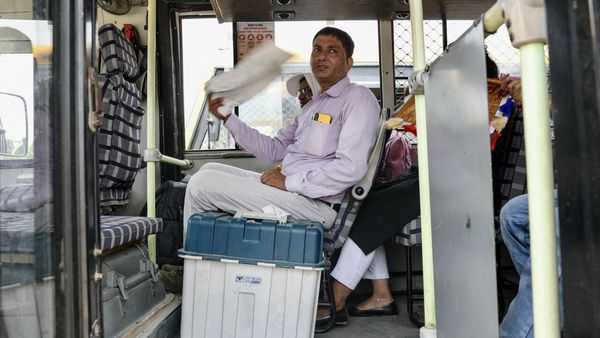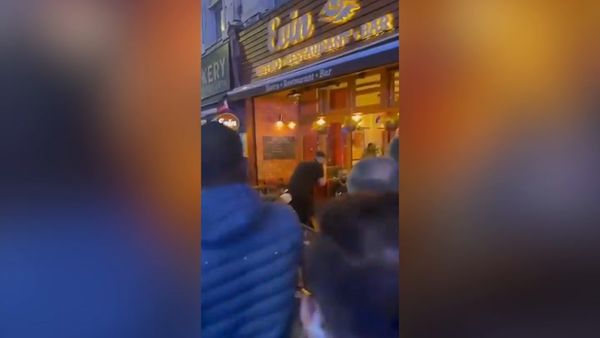
As Britain’s National Health Service turns 75, six people share how the NHS has saved their lives over seven decades, thanks to pioneering medical advances, swift action in emergencies and staff who went above and beyond.
‘I contracted polio in 1949, aged two’
Jenny, 76, retired, from Dorset
“I contracted polio in the outbreak of 1949, at the age of two. My older sister slept in the same room, but she didn’t catch it. I was told I collapsed at the bottom of the stairs, an ambulance came, I was wrapped in a red blanket and taken away to Cambridge. Polio was a killer back then – vaccines didn’t come until the mid-50s and my parents thought they’d never see me again.
“I stayed in an isolation hospital for three months and was in an iron lung [a type of mechanical respirator which encloses most of a person’s body] for a while. Nobody was allowed to visit. My parents didn’t know what was happening to me, we didn’t have a phone, very few people did. It was terrible for them.
“But after I came out of hospital, wearing a calliper on my leg, things went on as normal. Someone said to my mother, ‘At least you’ve had your money’s worth from the NHS’.

“I still have a limp today, and my lower leg is still sort of paralysed. But luckily, I did develop some muscle strength, so much so that after a couple of operations when I was 18, I actually started working in the NHS. I became a student nurse at King’s College hospital in London, and later a midwife and a health visitor, and spent my entire working life in the NHS.
“I don’t know what would have happened without the NHS, which was brand new at the time, of course. My parents weren’t rich and were very grateful for it.”
‘The NHS saved not only my life but both my babies’
Jo Wright, 39, an arts manager from Birmingham
“The NHS saved not only my life but that of both my babies. I had an incredibly complex second pregnancy, after experiencing a premature birth and postnatal depression with my first child, born in 2013. I had antenatal psychosis and was treated by a specialist psychiatrist for three months, who helped me unpick my fears and feelings.

“I was in a good mental place when I developed gestational diabetes in my third trimester, which was initially managed through diet and then via insulin. I developed further complications and was sent to the antenatal ward, where they discovered I was malnourished, despite eating and drinking normally.
“Thankfully, the specialist team at the Royal Surrey diabetes clinic were able to diagnose ketoacidosis, incredibly dangerous if undiagnosed. They changed my treatment and medication, and because they were able to connect the symptoms so quickly I was able to carry my baby to full term. He was delivered in the Royal Surrey by a brilliant crash team after his heart rate dropped during labour.
“Without the NHS, neither of us would be here, and they couldn’t have taken better care of us.”
‘I had cancer but I’m now fitter than ever’
Alan Martin, 67, retired operating department practitioner in Weston-super-Mare
“In April 2016 I was diagnosed with a grade 3 muscle-invasive bladder cancer tumour. I was absolutely devastated. I don’t even remember driving back from the consultant that day. I’d always looked after myself. All the things you expect to get cancer from, I didn’t do any of that – I ran marathons.

“I received chemotherapy and then a radical cystoprostatectomy in August 2016 at Southmead hospital Bristol, carried out by a top urologist. It resulted in a permanent stoma and urostomy and there were complications post-op, including pneumonia and I was in hospital for over two weeks.
“I raced back to work but I was very depressed after the surgery with suicidal thoughts, I could not accept the stoma. I had fabulous support from the stoma nurses and 18 months of psychological support.
“Now I am fully recovered, very active, I have done many ultra marathons and I swim in the sea all year. That’s what they’ve done for me – kept me alive when I quite easily could not have been from the diagnosis, the post-op complications and suicidal thoughts – it was a triple whammy.
“I still keep in contact with the team which is lovely and I saw my urologist the other day. I’m fitter now than I’ve ever been in my life.”
‘I was one of the first to have a “hole in the heart” operation’
Derelyn Love, 76, a retired science teacher from Cheshire
“I was born in January 1947 just after the end of the war, in one of the coldest winters ever. It was detected early on that I had a problem with my heart. I was referred to a hospital in Liverpool. My parents were told there was nothing they could do and that I had a life expectancy of about 20 years.
“Luckily, when I was 11, my family moved to Yorkshire and I was referred to Leeds infirmary. There, Dr Geoffrey Wooler was a pioneer in open heart surgery along with Romanian-born, Marian Ionescu.

“At the same time in Hammersmith hospital, Denis Melrose had invented and built two heart-lung machines, one of which he sent to Dr Wooler.
“I was operated on when I was 14, in 1971, and was one of the first people to be given “the hole in the heart operation”. Obviously, I survived.

“I am now 76 and have had a wonderful life. I went to university and became a teacher, have been married 52 years and have three children, one of which is a cardiothoracic surgeon at a hospital in Liverpool. So in a way my story goes full circle!”
‘I had a cardiac arrest while running a marathon’
Peter Simpson, 36, postgraduate student from Thurso in the Highlands
“During the London Marathon in 2019 I suffered a cardiac arrest around 500 metres from the finishing line. I vaguely remember the start of the race but the actual event I don’t remember at all.
“Had it not been for the immediate CPR I received from nearby paramedics and subsequent treatment at the ICU at St Thomas’ hospital I have no doubt I wouldn’t be here today.

“NHS staff went out of their way to help my family and I get through the incident as well as possible. My family live in the far north of the Highlands and following a difficult journey down to London, staff at the hospital helped make sure they were OK, offering them accommodation close to the hospital to give them one less thing to worry about. It was the little things that made a difference.
“After I was discharged the doctor who treated me in Edinburgh was instrumental in helping me recover. He recognised both the mental and physical side of the process, assisting me in gradually getting back into running in a slow, sensible way.
“Four years on, I’m pleased to say I’ve fully recovered and, thanks largely to the treatment of the NHS staff, have successfully completed seven marathons – which included a successful return to London in 2021. I’ll forever be grateful to the NHS.”
‘I was in a coma in the ICU for 22 days with Covid’
Mustafa Mohsin Ali Mohamed, 59, self-employed businessman, from Pinner, Middlesex
“I became infected with Covid in June 2020, during the tail end of the first wave. My lungs gave in and I was hospitalised. I was in a coma in the ICU for 22 days, and then recovered slowly, spending 10 further days in a normal ward. Physiotherapy sessions brought me back.
“The emergency team at the Northwick Park hospital was remarkable and my family experienced a level of service from the NHS they had never dreamed was possible. Nobody was allowed to visit of course, but they were considerate and helpful and set up tablets so my family could see me. I was very impressed. My conclusion is that in emergency cases, their services shine, though often not so much in routine cases – I feel it is important to make this distinction.

“I’m turning 60 this September, am married with four children and nine grandchildren, and today, three years later, the only mark I have are keloids around my neck where they intubated me.
“There is truly nothing like the NHS, and in an emergency, I would not want to be in anyone else’s hands.”
In the UK and Ireland, Samaritans can be contacted on freephone 116 123, or email jo@samaritans.org or jo@samaritans.ie. In the US, you can call or text the National Suicide Prevention Lifeline on 988, chat on 988lifeline.org, or text HOME to 741741 to connect with a crisis counselor. In Australia, the crisis support service Lifeline is 13 11 14. Other international helplines can be found at befrienders.org







